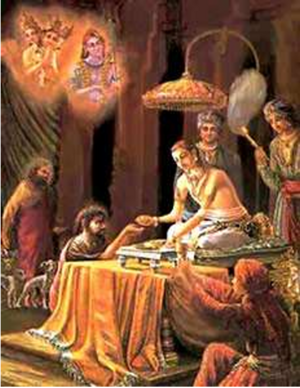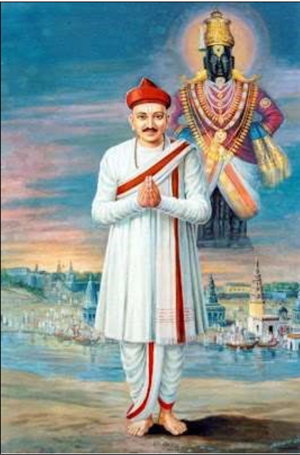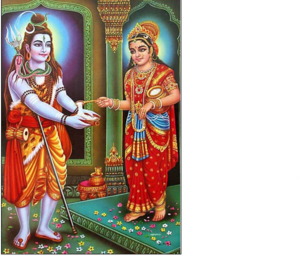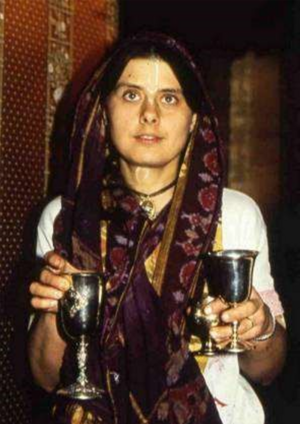Talk:Lokasaṃgraha through Selfless Sevā and Sacrifice
By Vishal Agarwal
A true Bhakta Yogī desires the good of the world because he has the Nārāyaṇa Bhāva – Everything is the Īshvara, and therefore, serving and loving others is equivalent to serving and loving Him. The Bhakti Yogī does not hesitate to undermine his interests for the sake of others’ welfare and wishes that everyone in this world is kind, helpful, and loving towards each other.
May the world be peaceful. May the wicked become gentle? May all creatures think of mutual welfare. May their minds be occupied with what is auspicious. And may our hearts be immersed in the selfless love for the Īshvara. Bhāgavata Purāṇa 5.18.9
A beautiful expression of this characteristic of the Bhakti Yogī is the Pasāyadāna, constituting verses 17721780 (or 1784-1802 in other editions) of Jnāneshvarī – a Commentary on the Gita by Sant Jnāneshvara (1275-1296 CE), given below with a translation-
| Pasaydan in Marathi | Translation in English |
|---|---|
| आता विश्वात्मकें देवें । येणे वाग्यज्ञं तोषावें । तोषोनिं मज द्यावे । पसायदान हैं ॥ 1 | May the Paramātmā of this Universe be pleased with this Yajna of my speech, and being satisfied, bestow His gift in my hands joined together to receive. 1 |
| जें खळांची व्यंकटी सांडो । तया सत्कर्मी रती वाढो । भूतां परस्परे पडो । मैत्र जीवाचें ॥ 2 | May the inclination of evil doers to indulge in cruel and evil acts end, and their desire to do good deeds strengthen. In this world, may love and friendship grow between all living creatures and remain firm. 2 |
| दुरितांचे तिमिर जावो । विश्व स्वधर्म सूर्ये पाहो । जो जे वांच्छिल तो तें लाहो । प्राणिजात ॥ 3 | May the darkness of evil in minds of all people in this world be destroyed by the light of the sun of the Svadharm (performance of their own duties). Whatever one desires, may he obtain the same. 3 |
| वर्षत सकळ मंगळी । ईश्वरनिष्ठांची मांदियाळी । अनवरत भूमंडळी । भेटतु भूतां ॥ 4 | May it rain spiritual people on this earth. May these spiritual people develop a large mass here so that everyone else can meet them and benefit from their noble company. 4 |
| चलां कल्पतरूंचे आरव । चेतना चिंतामणींचें गाव । बोलते जे अर्णव । पीयूषाचे ॥ 5 | The speech of these saints is like an ocean of ambrosia, they are like mobile gardens of Kalpatarus (wish full-filling trees) and villages full of Chintāmanī-s (wish fulfilling jewels). 5 |
| चंद्रमे जे अलांछन । मार्तंड जे तापहीन । ते सर्वांही सदा सज्जन । सोयरे होतु ॥ 6 | The noble people are always like the full moon but without blemish, the resplendent sun but without excessive heat. May they always show compassion/friendship to others.6 |
| किंबहुना सर्व सुखी । पूर्ण होऊनि तिन्हीं लोकी । भजिजो आदिपुरुखी । अखंडित ॥ 7 | What shall I say more? They who always serve and praise the Primeval Being (the Īshvara) obtain complete happiness in all three worlds and all their desires get fulfilled. 7 |
| आणि ग्रंथोपजीविये । विशेषीं लोकीं इयें । दृष्टादृष्ट विजयें । होआवे जी। 8 | And may they, who lead their lives completely according to the teachings of the scriptures, become distinguished in this world, obtain all the treasures of this life and the next and overcome all difficulties. 8 |
| येथ म्हणे श्री विश्वेशराओ। हा होईल दान पसावो । येणें वरें ज्ञानदेवो । सुखिया जाला ॥ 9 | Then my Guru Nivrittinātha said –‘Jnāneshvara, I shall grant you this charity in your hands as you ask above.’ Obtaining this blessing, I, Jnāneshvara, become blissful. 9 |
Many stories in our scriptures and tradition illustrate this beautiful quality of Bhakti Yogī-s. We narrate some of them below.
Story - The Generosity of King Rantideva (Bhāgavata Purāṇa)
Once, there was a famine in the kingdom of King Rantideva. The King was a man of great compassion and a devotee of Bhagavān Vishnu. He would donate to the needy whatever food and possessions he and his family had acquired. Therefore, they lived a life of great poverty and suffering for the sake of others. Once, he gave all his food to charity and did not get to eat anything for forty-eight days.
On the forty-ninth day, as he was starving to death, he somehow obtained some delicious food containing milk, ghee, and sugar and some water to drink. Just then, a poor and hungry Brahmana arrived at his doorstep and asked him for food. Rantideva saw Vishnu in all living beings and, therefore, offered him some food with respect as if he were feeding Bhagavān Himself.
When the Brahmana left, Rantideva divided the remainder of the food among his family members and himself. Just as he was about to eat, a Shūdra arrived at his doorstep, asking for food. Rantideva remembered Vishnu and again fed the Shūdra from his portion of the food as if the Shūdra were the Īshvara Himself. Now, a Chandāla arrived with his dogs and asked Rantideva for food, too. Out of compassion and thinking that Bhagavān Vishnu resides in all living beings, Rantideva gave all the remaining food to them. Now Rantideva was left only with water and was just about to drink it when a thirsty person arrived at his doorstep and begged him piteously for some water. Rantideva forgot his thirst and hunger and was filled with compassion and love. He said–
I do not desire from the Supreme Controller the attainment of the eight perfections [siddhis], nor do I ask for the cessation of a repeated birth; I accept all hardship in my stay among all the living beings so that they may become free from suffering. I am freed from all the hunger, thirst, fatigue, and shaky body, as also from the poverty, distress, lamentation, depression, and bewilderment, with my handing over my water to maintain the life of this poor soul desiring to stay alive. Bhāgavata Purāṇa 9.21.1213
Saying these kind words, even though he was dying of thirst himself, Rantideva gave his water to the thirsty Shūdra. As he did this, the Devas manifested before Rantideva to honor him for his supreme sacrifice, for his compassion and love for all living creatures. Rantideva gave all that he had, not just for the sake of Brahmana, but even for the Chandāla and his dogs and the Shūdra. Although he was dying of thirst, he gave all the water he had to another thirsty man, even though that man was poor. This is because Rantideva equally saw Bhagavān Vishnu in all living creatures, and he put their suffering and pain before his.
Story - Dāmājī Pant Risks His Life to Help Starving Villagers
Several hundred years back, in the kingdom of Bidar, ruled by a Muslim Sultan, there was a pious man named Damaji Pant. He was a great Bhakta of Bhagavān Vithhala, a form of Vishnu, worshipped in the town of Pandharpur. The Sultan had appointed Damaji as a revenue collector in the town of Mangalwedha and its surrounding regions.
One year, a terrible famine broke out in that area. Seeing many people starving, Damaji soon distributed his entire personal store of food to the poor. But that was not enough, and therefore, Damaji opened the royal granary in the town and asked the poor to take food from there. A jealous assistant tax collector who worked under Damaji thought that this was a good opportunity to please the Sultan. He wrote a letter to the Sultan notifying him that Damaji had distributed the royal storehouse of food to the starving poor without charging any money. This had resulted in a lot of loss to the Sultan.
The Sultan was furious. He asked his soldiers to go and arrest Damaji and haul him to the royal court. As Damaji was being hauled towards Bidar, he begged the soldiers to let him stop en route to pay his respects to Bhagavan Vitthala at Pandharpur. The soldiers agreed. There in the Mandir, Damaji prayed, “Hari Vitthala, today may be the last time I have come for your Darshana. I am going to see the Sultan, who is very angry that I distributed his granary to the poor and starving. I am requesting you to bless me. My life is now in your hands.” Saying this, he asked the soldiers to take him to the Sultan.
Meanwhile, Bhagavān Vitthala took the form of a Mahār, an untouchable, and rushed to the court of the Sultan before Damaji Pant and the soldiers arrived. There, he produced a letter in the handwriting of Damaji and said to the Sultan, “Your majesty, I am Vitthonaik, the servant of Damaji. He has sold the grain at a great profit. This letter confirms this fact. Damaji has asked me to give you this bag of gold coins that he earned from the sale of the grain to starving people.” When the Sultan saw a large number of gold coins, he felt guilty that he had suspected an honest revenue officer.
Vitthonaik left. When Damaji arrived at Bidar, the Sultan thanked him for selling the grains at a huge profit. Damaji was surprised, “But I truly gave it away for free.” The Sultan responded, “Then where did your servant Vitthonaik get these gold coins from? And did you not write this letter that you sent it through him to me?” When Damaji saw the letter and the gold coins, his eyes were filled with tears, and he said, “Your Majesty, it was none other than Bhagavan Vishnu who came disguised as an untouchable to save my life. The Sultan was astonished at hearing Damaji’s story. Damaji now requested, “I request your permission to retire. I want to spend the rest of my life serving Bhagavan Vitthala and sing Bhajans in his honor.” The Sultan granted his request. Damaji now lived the remaining years of his life in Pandharpur, composing and singing Abhangs – Marathi Bhajans in praise of Vitthala.
Story: The Charity of Dokka Sitamma (1841-1909 CE)
The holy city of Varanasi is said to be blessed by Annapurna Devi, a manifestation of Devi Parvati, who gives food to humanity. It is believed by the Hindus that due to Her blessing, no one will ever go hungry in Varanasi. In the temple of Annapurna Devi in that city, there is also a picture of Dokka Sitamma, a philanthropic widow who lived barely 100 years ago.
Dokka Sitamma was widowed at a young age, even before she and her husband had any children. She lived all alone in her hut, located in a fertile district in the coastal area of the state of Andhra Pradesh in India. She had inherited several acres of fertile land on which were grown crops of various kinds.
Every day, she would cook a lot of food and send out a call to whoever wanted to join her for food. She was sensitive enough to understand that the poor and hungry people are sometimes too embarrassed to beg for food. But when she invited all to her door, they felt welcomed to arrive and leave after filling their stomachs. She served food to everyone hungry, without regard to whether they were rich or poor, of high or low social status, man or woman. This went on for a few decades. Meanwhile, her greedy neighbors and relatives gradually robbed her of the land that she owned. Her wealth decreased day by day. But still, she lovingly continued to call people over for food every day.
So lovingly, she fed everyone that those who benefited from her generosity started narrating miraculous stories about her. Someone reported that a person who ate from her hands was cured of some disease. Another person said that he bore enmity towards his family member, but after eating her food, the feelings of enmity and hatred disappeared from his mind. Sitamma continued to feed the poor for a few decades till she became very old and very poor. She decided that she would now use her remaining money to travel to Varanasi, more than 1000 miles away, for pilgrimage. She also hoped to die in that city, a dream for all pious Hindus. She hired a cart with a driver and bullocks and set out for Varanasi. A few miles from her home, however, when the cart stopped for the night, she heard a family comprising of a couple and their hungry children at the rest-house. The man was saying to his children, “I know you have not eaten today. But I have no money. Let us wait till tomorrow. We will reach Sitamma’s home, and she will surely have some food to share.” The children were really hungry and started crying.
Sitamma immediately woke up the driver and commanded him to rush the cart back to her house. The driver protested but to no avail! The following day, the family arrived, and Sitamma had food ready for them. She had abandoned her trip to Varanasi, realizing that there were people who needed her. But there was something greater that she had sacrificed – her self-respect. She had used up all her money for the trip and had nothing left to buy food. To save the hungry family from the embarrassment of begging, she had gone to her neighbor’s home and begged for some food for them! When Sitamma passed away in her hut, it is said that a bolt of lightning arose through the roof of her hut and disappeared into the skies. In the Hindu tradition, this is treated as a sign that the person who had died was a great soul. Sitamma surely was one and a jewel of Hindu society. Today, she is considered an Avatāra of Devi Annapūrņā, and her picture is worshipped in Her shrine in Varanasi.
Story- The Supreme Sacrifice of Hlādinī Devī
Hladini Devi Dasi was born in 1949 and grew up in the suburbs of Detroit. In 1969, she was highly impressed by the Gaudiya Vaishnava Hindu philosophy of Hare Krishnas and decided to join their community. She was always happy and spent her entire time chanting the names of Krishna, reading scriptures, and serving others. She also went on a pilgrimage to Vrindavan, where she impressed local Indian devotees of Krishna with her sweet Bhakti, her cheerful nature, and her love for dancing and singing for Bhagavān. Around 1990, she chose to move to the West African nation of Liberia, which was then rocked by a deadly civil war. She spent her resources cooking for the homeless and the hungry.
The American government ordered all its citizens to vacate the country to save their lives. But Hladini Devi chose to stay in Monrovia, the capital of Liberia, so that she could continue to serve the homeless, the poor, and the injured by cooking food for them and providing them with a spiritual message of peace, and love for Bhagavān. One day (3rd October 1990), a group of armed men led by the country’s leader of the violent coup stormed the āshrama, where Hladini Devi Dasi stayed with other Hare Krishna devotees. He asked all men to come out and said that he would not harm the women, including Hladini Devi herself. But, Hladini Devi said that she would not leave the men, who were her students, and came in between them and the coup leader. She tried to grab the weapon from the coup leader, but unfortunately, he overpowered her and shot her dead. She became the first victim of the massacre there.
Hladini Devi chose to sacrifice her life with the name of Krishna on her lips rather than see her students, who needed her, die without any resistance.[1]
References[edit]
- ↑ Radhanath Swami. The Journey Within. Mandala Publications, 2016, pp. 94–97. San Rafael, California.




